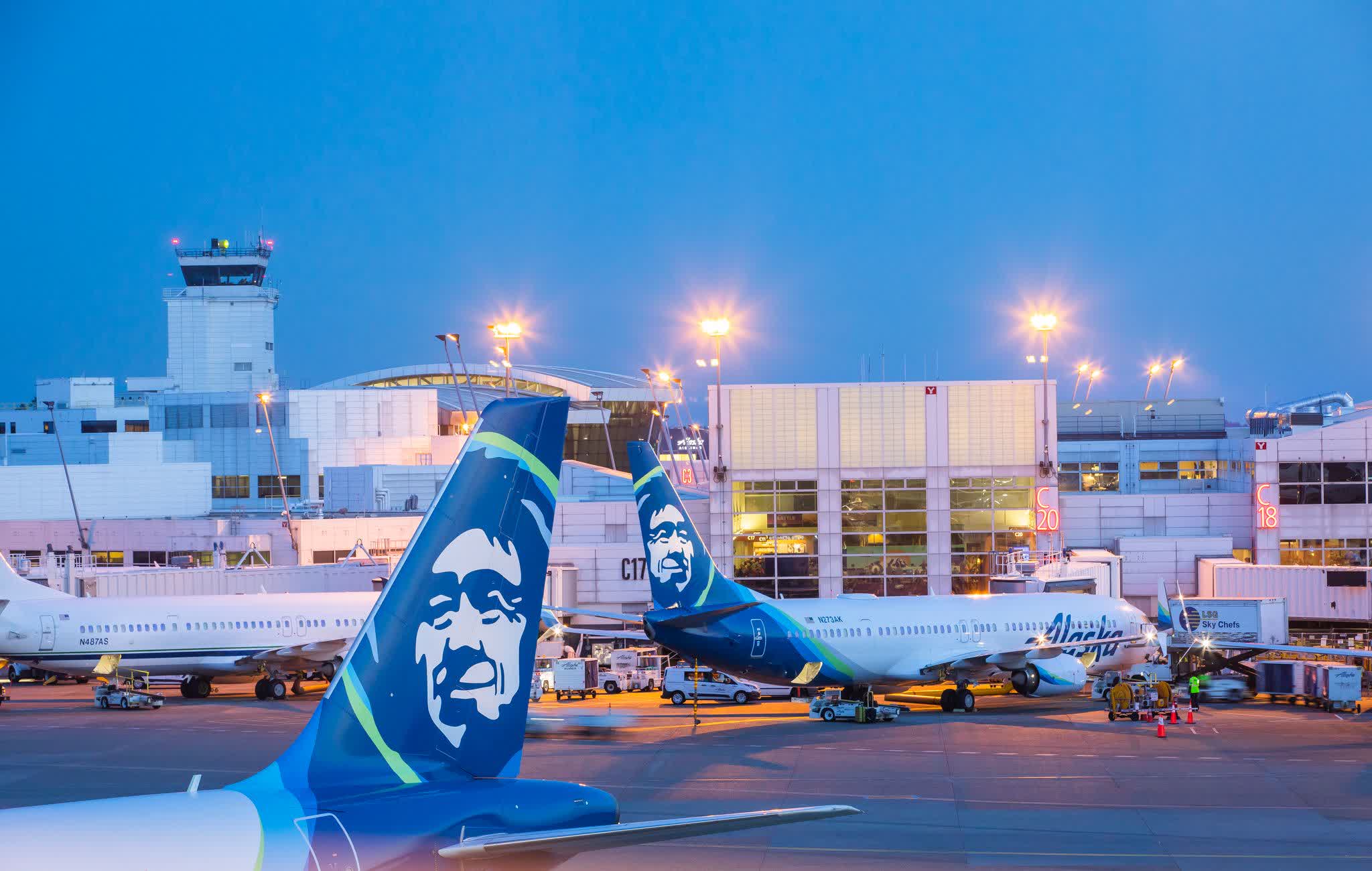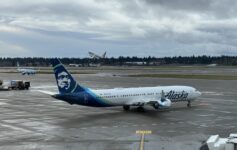
Alaska Airlines made headlines around the world after a flight returned to the gate earlier this week, with one pilot admitting he could not get along with his colleague. We now have a better idea of what happened.
Feuding Alaska Airlines Pilots Create Further Delay – What Really Happened?
Alaska Airlines flight AS1080, traveling from Washington (IAD) to San Francisco (SFO), retuned to the gate on Monday, July 18, 2022 after a disagreement between the two pilots occurred onboard. The flight was already delayed 90 minutes due to bad weather, but this was not a further weather delay.
Initially, we had only a handful of passenger reports that shared that one of the pilots came on the PA system and conceded the flight was returning to the gate “due to a failure to get along” with his co-pilot and that he his decision to leave the aircraft was “in the interest of safety.”
#alaska 1080 just returned to gate because the pilot and copilot couldn’t get along. Seriously. Pilot just left plane fuming after returning to gate from the tarmac. This is absolute ridiculous.
— NicaCounselor (@NicaCounselor) July 18, 2022
@tomcostellonbc this is a first for me. Alaska #1080 from IAD to SFO, already delayed due to weather, comes back to gate. Pilot says he and his first officer can’t get along… so in the interest of safety..” and then leaves the plane.
— Al Jackson (@HealthcareDC) July 18, 2022
A replacement pilot was found and the plane ultimately landed 2.5 hours behind schedule, which is not bad considering the compounded weather and personnel delay. The pilot was pulled from a later Alaska Airlines flight to Los Angeles, which also took a delay while it waited for a new pilot and also eventually landed about 2.5 hours late.
Until now, the reason for the bickering between the pilots has been a mystery. But now we have more insight.
A credible source has provided the backstory to Live and Let’s Fly:
- There were storms in the Washington, DC area
- The captain was arguing with ramp agents and gate agents to get the aircraft fueled, even though the ramp was closed
- this is standard practice during thunderstorms for the safety of ground staff
- During the taxi out, he was “barking orders” at the first officer
- At one point, the captain said, “Start #2. Get us EDCT. Get us the reroute.”
- EDCT means “Expect Departure Clearance Time”
- The first officer asked him to slow down and prioritize what he wanted done first
- The captain responded, “Just frigging do it.”
- It was the first officer who then said “we are done here” and opted to return to the gate
- But at the gate, it was the captain who told passengers that he could not get along with the first officer and stormed off
All of this sounds like a credible account to me.
The Alaska Airlines Pilots Handled This Correctly
Many passengers were quick to attack the pilots for failing to get along, but I appreciate that at least one of the pilots recognized that they could not get along and opted to step off the aircraft. Had the two been bickering and another problem broken out onboard, the results could have been bad…or even catastrophic.
It sounds to me like the captain was in a foul mood due to the delay and took it out on everyone around him, including his first officer. If true, this was unprofessional behavior. Pilots are not entitled to bad days when the safety of hundreds of lives are in their hands.
That said, the fact that he stepped off the aircraft and refused to operate the flight is a sign of maturity. It is even more noteworthy that it was him, not the first officer, who ultimately stepped off, since he was the one most agitated.
CONCLUSION
We now have a better idea of what the two Alaska Airlines pilots were feuding about, which ultimately led to the flight returning to the gate and the captain stepping off. The captain will have to answer for his conduct (and for his level of specificity in what he told passengers, which casts an unprofessional image over Alaska Airlines), but the fact that he chose to step off is a sign of wisdom, not immaturity.




It sounds like he’s only halfway through anger management courses. Thank goodness he was smart enough to leave his shift. But my goodness sir, I hope you’re okay and get any help that may be needed.
I imagine this happens more often than we realize. Put two people in a small cockpit with the stress of delays etc and I imagine, given the personalities of some of the pilots (or anyone for that matter), like the one who ranted on about California liberals accidentally on a hot mic, that it occurs all over the world. Admittedly, never heard of a pilot walking off the plane as a result! Maybe it’s happened but was just announced as being an operational issue and the flight needed to return to the gate.
Storming off of the flight was the ‘mature’ response? How about cutting the crap and being an adult for the remainder of the flight? Is that no longer an option?
I don’t disagree, but when two people cannot get along, walking away is indeed the most mature response.
“walking away is indeed the most mature response”
I disagree. Walking away is more mature than starting a fist fight or wrecking a plane, but it is notably less mature than de-escalating the situation, negotiating a truce, or agreeing to set aside personal emotions to competently complete a professional task.
It is troubling that this pilot’s maturity does not extend to options beyond “get what I want when I act unprofessionally or I walk away”
With a plane full of people (well, two planefuls) massively inconvenienced because he didn’t think he could control his temper for a few hours.
This is a huge red flag. He should be removed from service until cleared by mental health professional.
I concur.
The FO did the right thing.
If the Captain is going to act in an agitated or unprofessional manner then the FO has the power to stop the flight.
A cancelled flight is much better than a crashed flight and we know for a fact that a lack of coordination between air crew causes crashes.
Obviously a rare event, but I have a feeling this happens more often than gets reported. But in other cases, one of the pilots has a good sense of coming up with a good excuse like calling out sick.
If there is a desire for disciplinary action, it could be directed at either pilot, depending on who is liked and has political connections.
Captain: Can be faulted for his temper. Might even accuse him of having psychiatric problems and unfit to fly.
First Officer: Insubordination. Disregarded a direct and safe order but went back to the gate. Instead, the captain was the wise one to disengage while the flight was still on the ground.
If you’re familiar with CRM (crew or cockpit resource management), which is required training for all US and European commercial pilots, you’ll know that “Just friggin do it” isn’t something that should be said in communications between a pilot and the first officer, or really anyone on the aircraft for that matter.
The FO is not guilty of insubordination. If the account above is complete and accurate (which it probably isn’t), perhaps the FO could be accused of being thin skinned (seems he jumped pretty quick to “we’re done here” but maybe there was more to it). The pilot’s behavior is without question inappropriate, if depicted accurately.
Walking away once you’ve acted entirely inappropriately is better than starting a physical altercation but does not excuse the inappropriate behavior.
I would feel safer leaving 2.5 hrs later with a crew who could function as a team. The right call was made. It would be interesting to see if there is some history between these 2 or with the capt and other fo’s.
The possibility of this Capt having similar conflicts with other FO’s is just as likely as this FO having similar conflicts with other Capt’s. Is there an inherent conflict in the way an “ old school “ Capt has the final say and a “ millennial “ FO wants his way ?
There was an episode on one of those real-life crash investigations shows on YouTube where the pilots were not getting along and eventually, something was missed and the plane crashed, with hundreds of lives lost. Right decision to abort the flight.
There are occasional disagreements in any cockpit.
Fortunately we are trained to quickly resolve the issue and safely finish the mission.
Sounds like this captain (small “c” intentional) totally failed leadership principles!
The decision to return to gate was perhaps the safest route. Hopefully, he took early retirement to deal with his anger issues, outside of the cockpit.